What to Know Before Getting a Dental Crown: Types, Pros, and Cons

What to Know Before Getting a Dental Crown: Types, Pros, and Cons
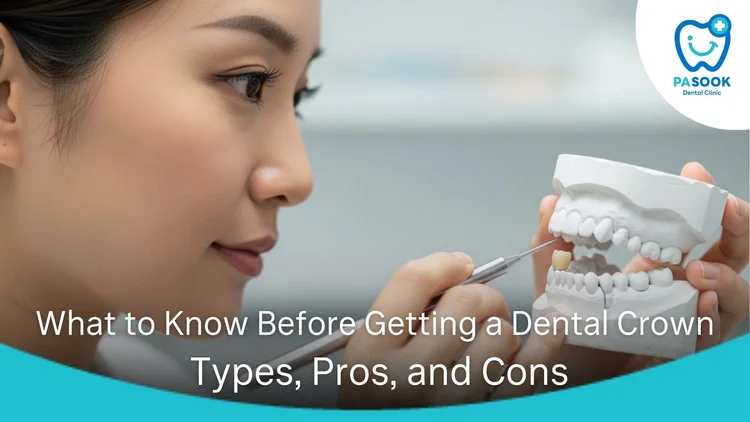
Dental crowns are a common and effective dental treatment designed to restore teeth that are severely decayed, cracked, or have undergone root canal therapy. Many people wonder what exactly dental crowns are and how they can benefit their oral health. In this article, PASOOK Dental Clinic will guide you through a detailed overview of dental crowns including the various types, key advantages and disadvantages, and essential care tips so you can confidently choose the best option for your smile.
In this article, PASOOK Dental Clinic will take you through an in-depth look at dental crowns covering the different types, their pros and cons, and how to care for them afterward so you can make your decision with confidence.
Table of Contents
1.What is a Dental Crown?
2.What Are the Different Types of Dental Crowns?
3.Who Should Consider Getting a Dental Crown? Key Signs to Know
4.6 Key Benefits of Dental Crowns
5.6 Potential Drawbacks of Dental Crowns
6.Post-Dental Crown Care Tips
What is a Dental Crown?
A dental crown is a restorative dental treatment that involves placing a custom-made cap over a natural tooth to strengthen it, restore its shape, and protect it from further damage. During the procedure, the dentist will remove a portion of the tooth structure before fitting the crown precisely over the prepared tooth.
Dental crowns are considered a type of fixed prosthesis, meaning they are permanently cemented and cannot be removed by the patient. They can be used on natural teeth as well as dental implants. The main benefits of dental crowns are protecting weakened teeth from breaking further and enhancing their natural appearance.
What Are the Different Types of Dental Crowns?
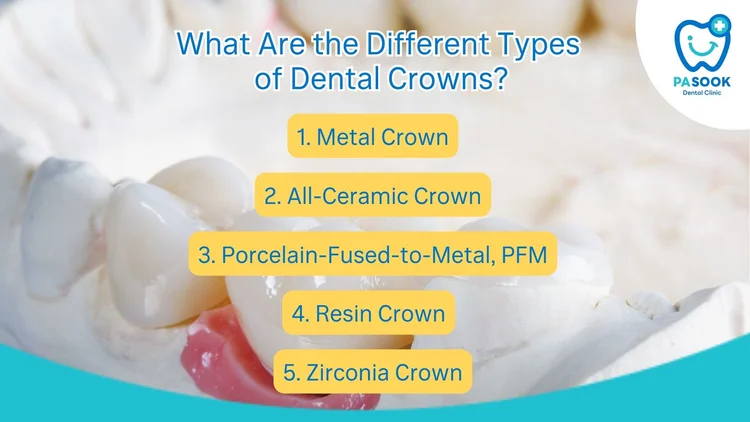
Dental crowns come in various types, each made from different materials with distinct properties. The choice depends on the location of the toothwhether its a front tooth or a molar. The most commonly used types of dental crowns include:
1.Metal Crown
Made from metals such as gold, palladium, or nickel, metal crowns are very strong and can withstand heavy chewing forces. They are best suited for molars where aesthetics are less of a concern. However, their metallic color makes them less ideal for front teeth.
2.All-Ceramic Crown
Constructed entirely from ceramic material, these crowns closely resemble natural tooth color and translucency. They are ideal for front teeth where appearance is important, popular among those seeking a natural, bright smile.
3.Porcelain-Fused-to-Metal, PFM
These crowns have a metal core for strength and a porcelain outer layer that mimics the look of natural teeth. Suitable for both front and back teeth, but over time, the metal edge may become visible near the gum line.
4.Resin Crown
Made from resin material, these crowns are more affordable and often used as temporary solutions or in urgent cases. However, they are less durable and not as strong as other types.
5.Zirconia Crown
Zirconia crowns combine strength and aesthetics with a natural tooth-like color. They can be used for both front and back teeth and are an excellent choice for those seeking durable and visually appealing crowns over the long term.
Who Should Consider Getting a Dental Crown? Key Signs to Know
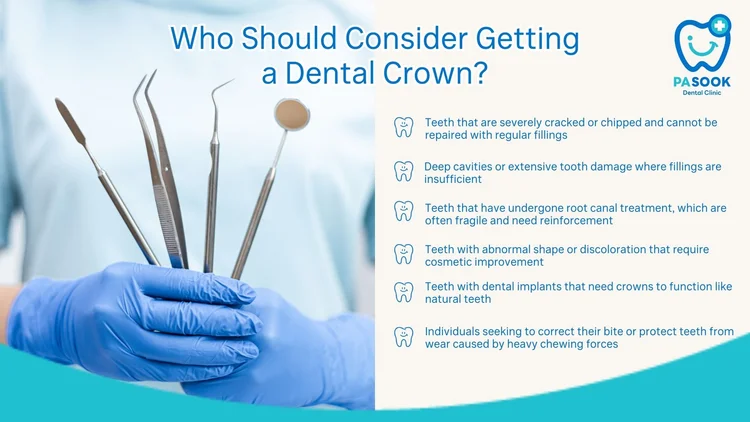
Dental crowns help restore both the strength and appearance of your teeth, allowing you to use your teeth confidently and safely again. Crowns are suitable for individuals facing the following dental issues:
- Teeth that are severely cracked or chipped and cannot be repaired with regular fillings
- Deep cavities or extensive tooth damage where fillings are insufficient
- Teeth that have undergone root canal treatment, which are often fragile and need reinforcement
- Teeth with abnormal shape or discoloration that require cosmetic improvement
- Teeth with dental implants that need crowns to function like natural teeth
- Individuals seeking to correct their bite or protect teeth from wear caused by heavy chewing forces
6 Key Benefits of Dental Crowns

Dental crowns offer several important benefits that help restore and protect your teeth, including:
1.Strengthens damaged teeth
Crowns reinforce teeth that are weakened due to decay or root canal treatment, allowing you to chew and bite with confidence.
2.Prevents further damage
By covering the remaining tooth structure, crowns protect against additional wear, cracks, or fractures caused by everyday chewing forces.
3.Enhances appearance
Made from materials that closely mimic natural teeth, crowns can improve the color and shape of your teeth, giving you a more attractive and confident smile.
4.Durable and long-lasting
With proper care, high-quality crowns can last many years, providing a reliable solution for restoring your dental health.
5.Corrects bite issues
Crowns help balance your bite, reducing discomfort and preventing jaw problems caused by misaligned or uneven teeth.
6.Suitable for all tooth positions
Whether its a front tooth requiring aesthetic appeal or a back molar needing to withstand strong chewing forces, crowns can be tailored to fit any tooth.
6 Potential Drawbacks of Dental Crowns
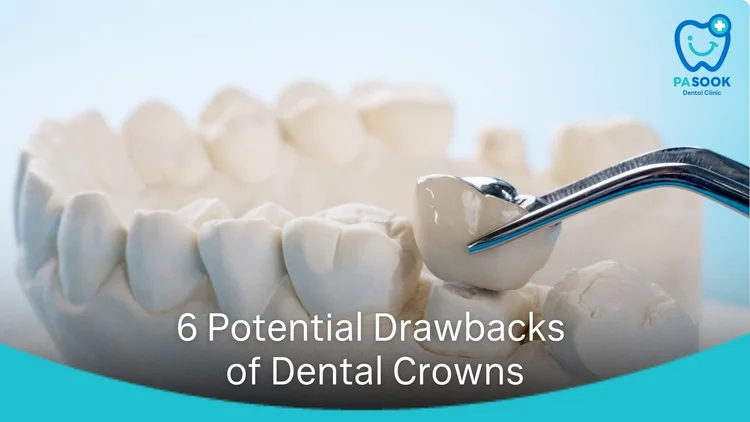
While dental crowns offer many benefits, there are some limitations and potential downsides to consider:
1.Tooth structure needs to be trimmed
To prepare your tooth for a crown, the dentist must remove some of the natural tooth material. This process is irreversible.
2.Higher cost
High-quality crowns, especially those made from ceramic or zirconia, can be relatively expensive.
3.Temporary sensitivity
You may experience tooth sensitivity or mild discomfort after tooth preparation or crown placement, but this usually fades over time.
4.Crowns can loosen or fall off
If the crown isnt properly cemented or if the underlying tooth has issues, the crown may become loose or detach and will need prompt dental attention.
5.Material wear and tear
Crowns can wear down, chip, or break over timeespecially resin crowns, which tend to be less durable than ceramic or metal options.
6.Possible gum irritation
Some patients may experience gum inflammation or irritation around the crown if oral hygiene is not properly maintained.
Post-Dental Crown Care Tips
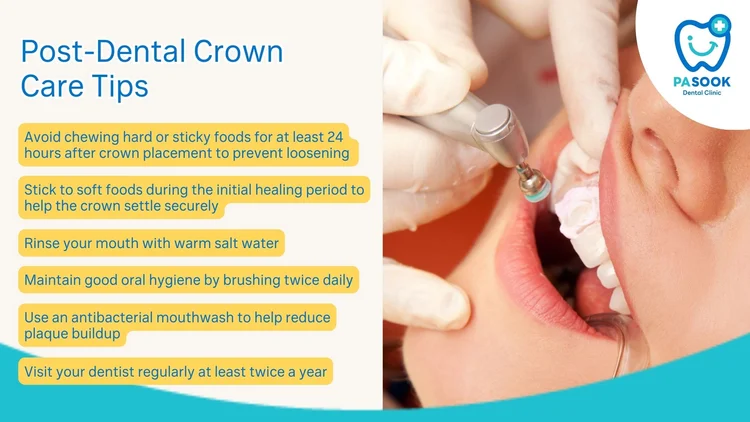
After getting a dental crown, following proper care instructions is essential to ensure its longevity and prevent complications:
- Avoid chewing hard or sticky foods for at least 24 hours after crown placement to prevent loosening or damage.
- Stick to soft foods during the initial healing period to help the crown settle securely.
- Rinse your mouth with warm salt water (mix 1 teaspoon of salt with 1 cup of warm water) at least three times a day to reduce swelling and discomfort. You may also take pain relievers as directed by your dentist.
- Maintain good oral hygiene by brushing twice daily and flossing regularly to clean between teeth and around the crown.
- Use an antibacterial mouthwash to help reduce plaque buildup and protect against cavities and gum disease.
- Visit your dentist regularlyat least twice a yearfor check-ups to monitor the crowns condition, checking for wear or looseness.
Remember, while dental crowns restore strength and appearance to your teeth, maintaining good oral health practices is crucial to prevent decay and gum problems around the crowned tooth.
Dental Crowns Explained: What They Are, Who Needs Them, and the Types Available
A dental crown is a restorative treatment that helps strengthen and protect a damaged tooth. It involves placing a custom-made cap over the natural tooth to preserve its structure and restore its appearance and function.
Crowns are ideal for individuals with issues such as cracked or severely decayed teeth, teeth that have undergone root canal treatment, or dental implants that require a functional crown. Theyre also a popular option for those looking to improve the shape or color of their teeth for cosmetic reasons.
While crowns are durable and can significantly enhance your smile, proper care is essential. This includes regular brushing and flossing, as well as routine dental checkups to ensure the crown remains in good condition and lasts as long as possible.
If you're considering a dental crown, PASOOK Dental Clinic offers personalized treatment plans, experienced specialists, and modern equipmenthelping you restore your smile with confidence and comfort.


